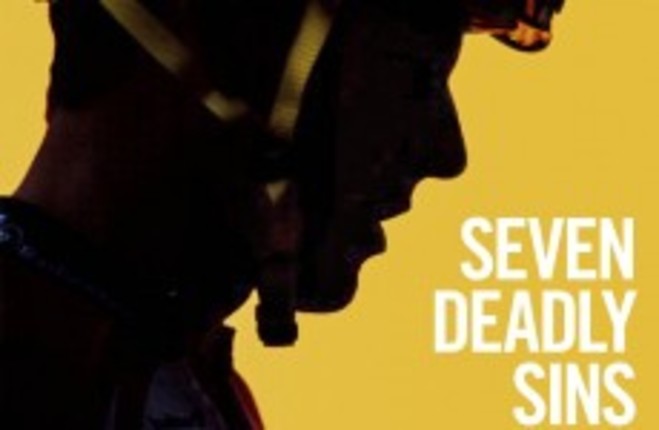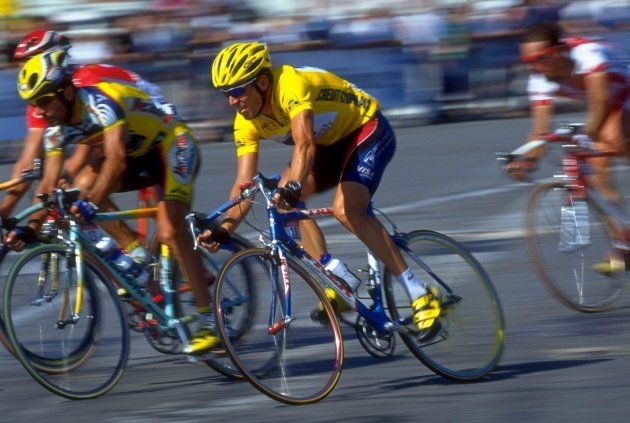THE NEWS THAT Lance Armstrong would not be contesting the doping allegations, made by the United States Anti-Doping Agency against him, was announced in August.
It marked the end of a 13 year pursuit waged by sports journalists David Walsh, Pierre Ballester and Paul Kimmage.
Walsh spoke to Newstalk in advance of the release of his new book on Armstrong and the blood-doping scandal that continues to dog the world of professional cycling.
The Sunday Times journalist has described his journey from a cycling fan with a press pass to one of a small cadre of writers that was determined to expose the inherent flaws in cycling.
Walsh’s pursuit of Armstrong, who won seven Tour de France titles only to have them later stripped from him, began six years after their first one-on-one interview in 1993.
‘This kid is going to be somebody’
Armstrong was 21-years-old when he sat down with Walsh for the first time.
The author explained that the Texan had developed a reputation as a promising young cyclist with the potential to be the best of his generation.
During the interview, Armstrong spoke about his drive and determination. Armstrong declared, according to Walsh, that he had ‘heart, soul and I’ve got guts. I’m not going to be denied’.
That evening, Walsh met up with Kimmage and tour photographer Billy Stickland for dinner and told them ‘this kid is going to be somebody’.
Walsh came across Armstrong, who was making his comeback after successful cancer treatment, again before the Tour de France, dubbed as The Renewal Tour after a raft of doping scandals earlier in the decade.
“I was ready to behave as a proper journalist in 1999,” said Walsh.
“I say that because when I started in the 80′s I was more of a fan with a typewriter.”
Armstrong stormed to the Tour de France that summer, setting record times and winning four stages along the way.
“I had a bad sense against Armstrong from the first day of that tour,” said Walsh.
Confrontation
Walsh raised his concerns during and after the tour but, he said, when doping questions were put to Armstrong, his attitude conveyed that performance enhancement was a problem of the past and in no way connected to him. He added:
I just thought, ‘Mate, hold on here. Do you take us for idiots?’
Walsh pointed out that, to him, it was ‘blindingly obvious’ that Armstrong was a drugs cheat. That view was not shared by all in the sport.
He commented, “You had people in the sport who were always complicit in the cover-up… they were bullying people into silence.” He added:
“They saw this American cancer survivor as the perfect vehicle to respectability.”
Armstrong in action at Le Tour in 1999. (©INPHO/Allsport)
A second meeting
The Millennium came and went. As Armstrong continued to dominate the sport, Walsh and his fellow believers kept up the chase for justice.
Walsh’s 1999 New Year’s resolution, written in his newspaper column, to bring evidence ‘against the greatest drug cheat in cycling’ earned him a personal call from the American.
It took a year to arrange a second sit-down with Armstrong and, on this occasion, a lawyer [Bill Stapleton] for the cyclist was present. Walsh did not beat around the bush.
Bill put down his tape recorder, I put down my tape recorder, look across the table and say ‘Look Lance, I don’t believe you’re clean’.”
He added, “The only subject on my agenda is doping. I have to try and establish whether you’re the champion we can applaud, that we can acclaim. Because, at this point, I don’t believe you are.
“[Lance] said that’s fine and we talked about doping but his answers, they were ridiculous.”
Brick wall
Armstrong’s defence at the time – and it remains so to this day – revolves around the fact that he never tested positive for blood doping.
In Walsh’s co-authored L.A Confidentiel book, published in 2004, he included statements from ex-teammates, rivals, doping experts and former masseuse Emma O’Reilly to debunk Armstrong’s whiter-than-white assertions.
The book was a commercial and critical success but it failed to elicit any official reviews from the International Cycling Union, sponsors or tour organisers. Walsh brought out a second book, From Lance to Landis, a year later.
He revealed that Armstrong labelled him a troll and often referred to him as ‘the little idiot’. Walsh added:
It was slightly reassuring because if I wasn’t getting somewhere it would not have bothered him.”
USADA’s report, released in October, stating that Armstrong’s US Postal Service team had ‘groomed and pressured athletes to use dangerous drugs’ was vindication for Walsh and the others that crusaded against the seven-time champ.
He remains unhappy, however, that UCI president Pat McQuaid ‘had his chance to show his colours in the last seven years’ but failed to retrospectively pursue Armstrong and other drugs cheats.
The fight goes on
With Armstrong choosing not to fight the stripping of his Le Tour and Olympic baubles, Walsh feels he may be return to return to the tour as a beat journalist.
His investigative and querying mind has not wilted in the 13 years that he became obsessed with exposing Armstrong and his cohorts.
He revealed, “A lot of people think Team Sky are clean. I think they may be but I have to make sure.”
Walsh also noted his displeasure at the close relationship many journalists have with current Le Tour champion Bradley Wiggins.
“Too many journalists are calling Bradley Wiggins ‘Wiggo’.
“We’re not in this business to make friends with the champions.”
You can listen to the full interview here >>


